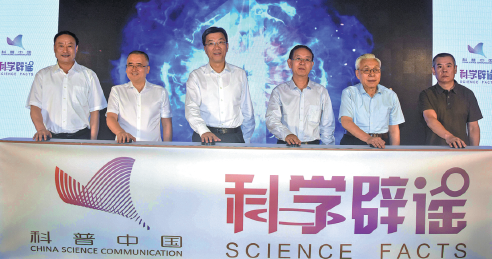New media drive growth of scientific knowledge
By Zhang Yangfei | CHINA DAILY | Updated: 2019-12-13 09:50

Netizens are using online platforms to acquire accurate information, debunk folklore and refute false claims. Zhang Yangfei reports.
Brown sugar and jujube dates aren't cures many Western women turn to when they have menstrual cramps, but in China, they were once some of the most widely believed and popular folk remedies for period pain and anemia.
However, the Chinese have begun to turn their backs on these remedies in recent years. Now, whenever Li Ruoxue has menstrual cramps, she rests and takes painkillers after learning from Dingxiang Doctor, a social media platform that debunks medical and health rumors, that: "Essentially, brown sugar is sucrose. It has little medical effect, but it makes you fat."
In recent years, China has seen a growing number of new media platforms like Dingxiang Doctor and scientists dedicated to refuting rumors and disseminating scientific knowledge. As a result, more young people accept scientific explanations, even though that may mean challenging old beliefs or even their parents.
Li is a loyal reader of Dingxiang Doctor. The Shanghai resident said she likes the platform because the advice is provided by qualified doctors and experts. She often uses it to refute healthcare guidance provided by her mother, who believes in folk remedies.
She said her family chat group on social media is like a battlefield sometimes, with many quarrels about health information with her mother.
"She often sends me articles with titles such as 'Doing this a few times a day will bring unexpected benefits to the body', or 'Eating such and such will cure organ disease'. I don't even bother to click on them," she said.
"I might as well drink plenty of warm water, go to bed early and get up early. Eating the messy foods suggested might even damage my kidneys."
Instead, Li regularly reposts articles from platforms such as Dingxiang Doctor, which has released posts such as "Pork bone soup cannot boost calcium levels" and "Garlic, onion and okra can't beat cancer", which challenge accepted folklore.
Although her mother has doubts about the articles and sometimes regards them as jokes, Li said her aim is to "brainwash" her parent by bombarding her with accurate information.
Growing trend
The 25-year-old is one of a growing number of Chinese, particularly young people, who are becoming more scientifically literate and have a greater desire for accurate information.
According to a quarterly report by the China Research Institute for Science Popularization that analyzes netizens' behavior and requirements for information, the science communication search index-based on the amount of time people spend on search engines-rose from 2.8 billion in 2014 to 9.2 billion last year. Young and middle-aged netizens were the main drivers of the trend.
The top search topics include: cutting-edge technologies; health and medical care; information technology; energy use; climate and environment; and food safety.
With the rapid development of the internet, new media such as Weibo and WeChat are providing important access to the contemporary science scene.
Immediate, convenient and interactive, these new media platforms quickly attract members of the public, and science enthusiasts have not missed the opportunity to promote their subjects.
For example, Weibo started in 2009. In August the same year, the Songshuhui Association of Science Communicators, a nonprofit science popularization body, registered with the platform and sent its first post, marking a new chapter in the use of such media.
In the past decade, the number of science bloggers has rocketed, and more than 26,000 accounts can be found on Weibo under keywords such as "science communication".The accounts cover a wide range of topics, including medicine, astronomy, archeology and biology.
Guokr, one of the most successful brands in science and technology education, has more than 9 million followers on Weibo, while Dingxiang Doctor has over 4 million.
Individual science communicators are also popular. For example, XueShu, a math and physics guru, has more than 13 million followers, while NASAWatch, Steed and WangShuang_UniverseOdyssey are some of the most popular astronomy experts and have high levels of interaction with millions of followers.
"Providing science education today is very different from five or 10 years ago," said Yun Wuxin, who has a master's in biochemistry from Tsinghua University and a doctorate in food engineering from Purdue University in the United States.
Yun, who has written about food health science for more than 10 years, said even five years ago, when social media was less developed, science writers like him mainly wrote blogs or were interviewed by traditional media outlets.
"Not many voices could appear on those platforms at that time. Not everyone had the opportunity to speak on such platforms. We just needed to make sure our content was correct, but the influence it had was determined by the media," he added.
As traditional media's voice becomes muffled by rapidly updated headline flashes on digital platforms, accurate content can easily become diluted in the sea of information, according to Yun.
"There are too many information channels. People might read 20 articles on one topic, and I would be happy if my article were one of them. However, it is debatable how many of those 20 articles are actually reliable," he said.
























